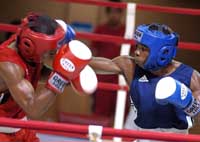Cuban boxers deported from Brazil after disappearing during Pan American Games
Two boxers deported by Brazil were back in Cuba after they disappeared during the Pan American Games last month and were arrested at a resort where officials said they partied and ran up an exorbitant bill.

Convalescing leader Fidel Castro said in comments published Sunday that the boxers would be confined to guest houses upon their return, although he promised not to harshly punish them.
Guillermo Rigondeaux, Cuba's top boxer and a two-time Olympic bantamweight champion, and Erislandy Lara, an amateur welterweight world champion, arrived in Cuba early Sunday after being deported from Brazil, Cuban state radio and TV reported without offering any specifics.
The boxers had failed to show up for their scheduled bouts during the Pan American Games last month, prompting their disqualifications. Brazilian police arrested them Thursday for overstaying their visas in the coastal resort city of Cabo Frio, near Rio de Janeiro, where authorities said they partied extravagantly.
Last month, German boxing promoter Arena said it had signed Lara and Rigondeaux to five-year contracts. Details of that deal are not clear. The two boxers told Brazilian police they had been contacted by a German businessman, and they had given their uniforms and passports to him.
Castro, who is recovering from intestinal surgery and hasn't been seen in public for more than a year, had blamed American money for their desertions last month, saying they were "knocked down with a blow straight to the chin, paid up with U.S. bills."
In his remarks published Sunday in the Communist Youth newspaper Juventud Rebelde, however, he was quoted as saying the boxers had "communicated that they had committed an error and that they repented."
Police also said the boxers had asked to go home.
Brazilian federal police inspector Felicio Laterca said Friday it remained unclear why Rigondeaux, 25, and Lara, 24, abandoned their delegation. But he said the boxers were "saying they are very dear athletes in their country and that's why they want to return."
Rigondeaux won the Olympic gold medal in 2000 and 2004 and is also a world champion. He became Cuba's top boxer after the retirement of Mario Kindelan in 2004 and was looking for his third Pan American Games title.
Castro wrote in his essay published Sunday that after the boxers return to Cuba, they "will be transferred provisionally to a guest house and they will be given access to their families. The press will also be able to contact them if it so desires."
He added that they would later be "offered decent tasks in sports according to their knowledge and experience."
"Brazilian authorities can rest easy in the face of inevitable campaigns by adversaries. Cuba knows how to handle itself in these circumstances. I, for my part, will sleep well," he wrote.
Castro did not say whether the men would be allowed to compete in the future, but top baseball players suspected of trying to desert in the past have been cut from the national team and given low-level coaching or other sports-related jobs.
Baseball slugger Kendry Morales was cut from Cuba's national team in early 2002 for unspecified "lack of discipline" following reports that he had tried to leave the island several times. He left Cuba for good on his eighth attempt two years later and was signed by the Los Angeles Angels.
Since the 2004 Olympics, Cuban boxing has been beset by defections, with several champions now fighting professionally in the United States and Europe.
In March, Arena signed Cuban Olympic champions Yan Barthelemy, Yuriorkis Gamboa and Odlanier Solis to contracts. The trio stole away during training in Venezuela in February for the Pan American Games, then crossed into Colombia and eventually traveled on to Germany.
Subscribe to Pravda.Ru Telegram channel, Facebook, RSS!


